Unit 3 The Million Pound Bank Note
文档属性
| 名称 | Unit 3 The Million Pound Bank Note |
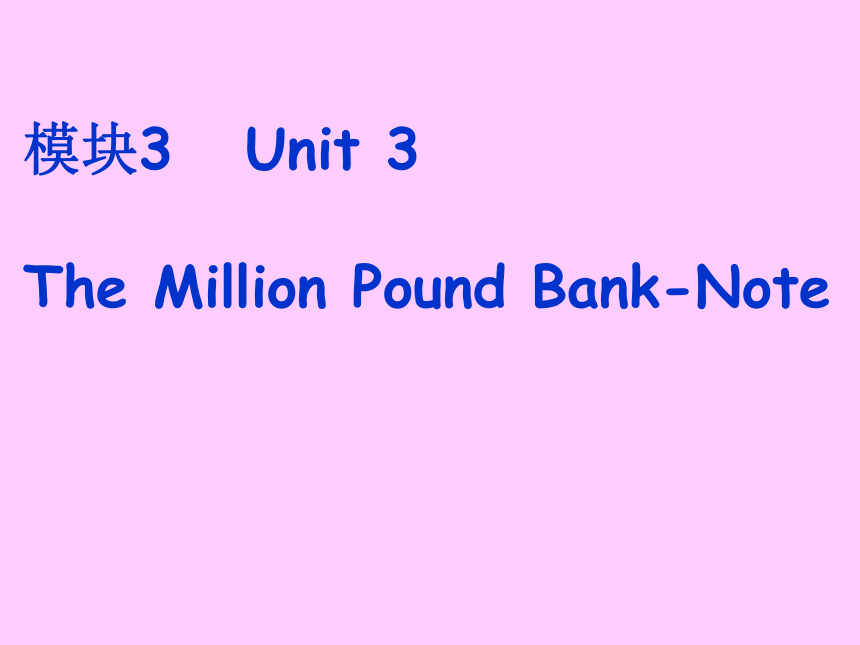
|
|
| 格式 | rar | ||
| 文件大小 | 680.2KB | ||
| 资源类型 | 教案 | ||
| 版本资源 | 人教版(新课程标准) | ||
| 科目 | 英语 | ||
| 更新时间 | 2009-08-16 00:00:00 | ||
图片预览

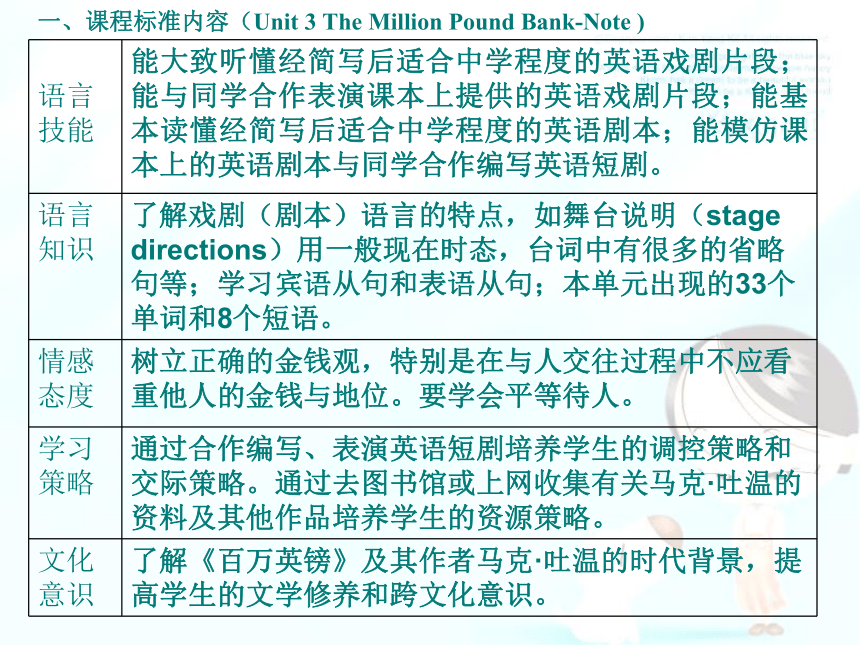
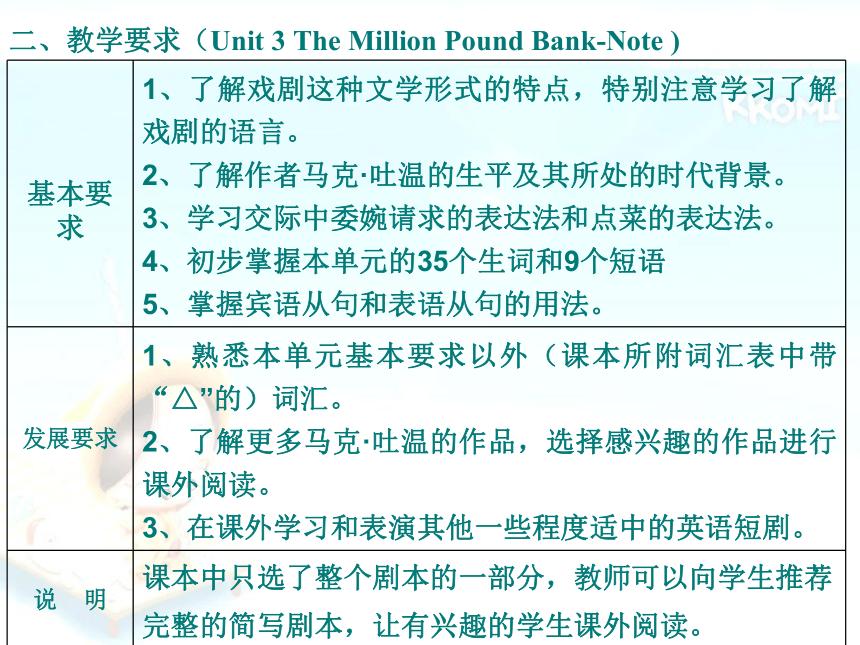
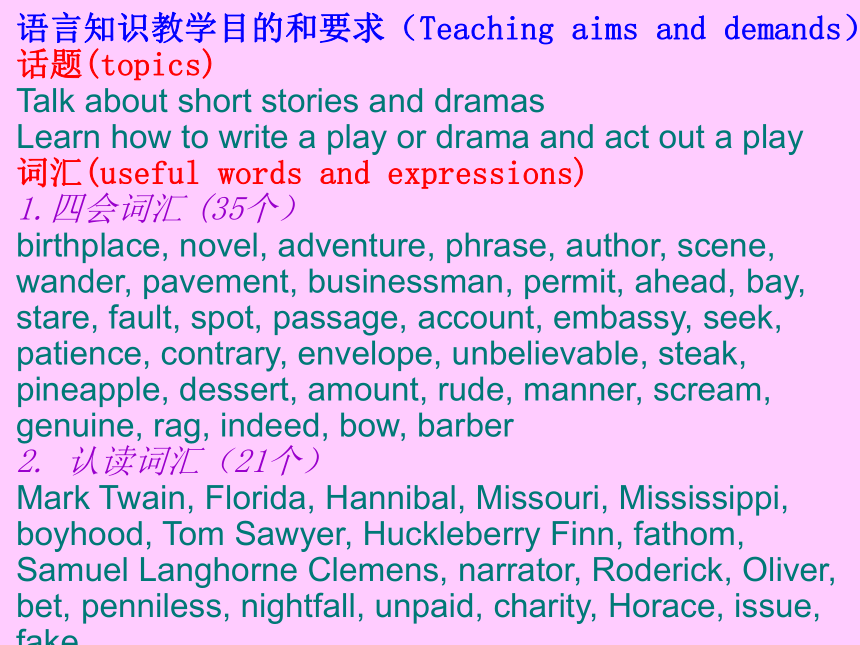
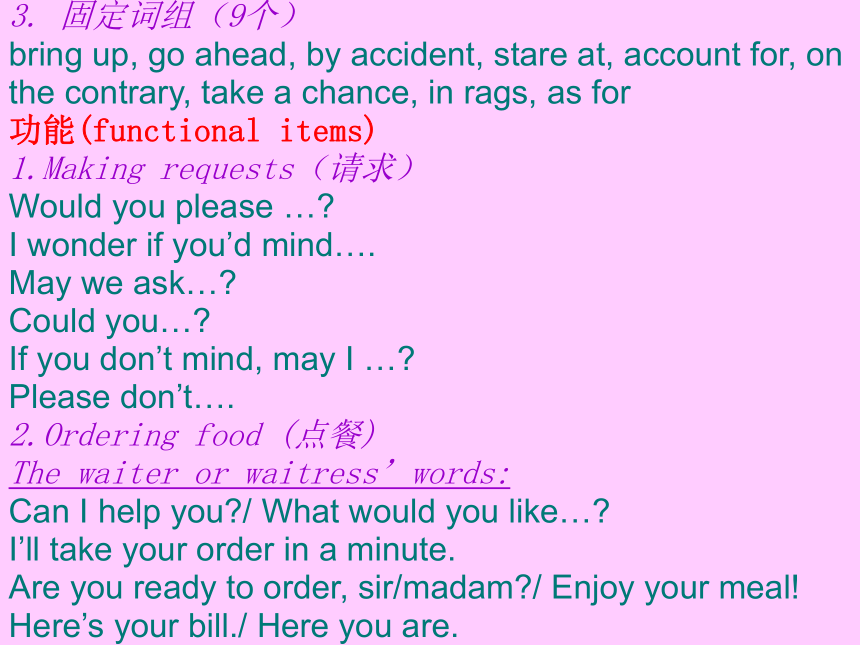
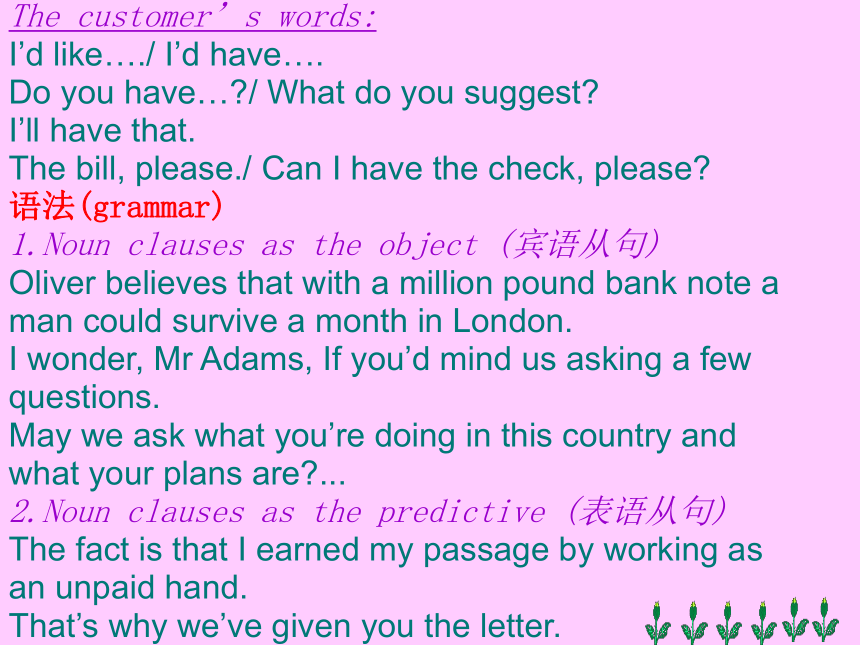
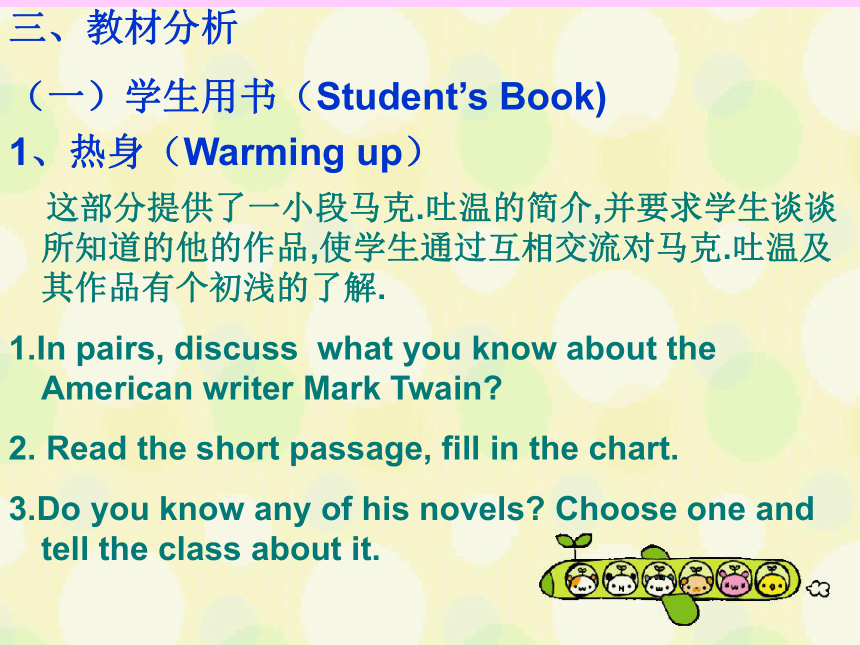
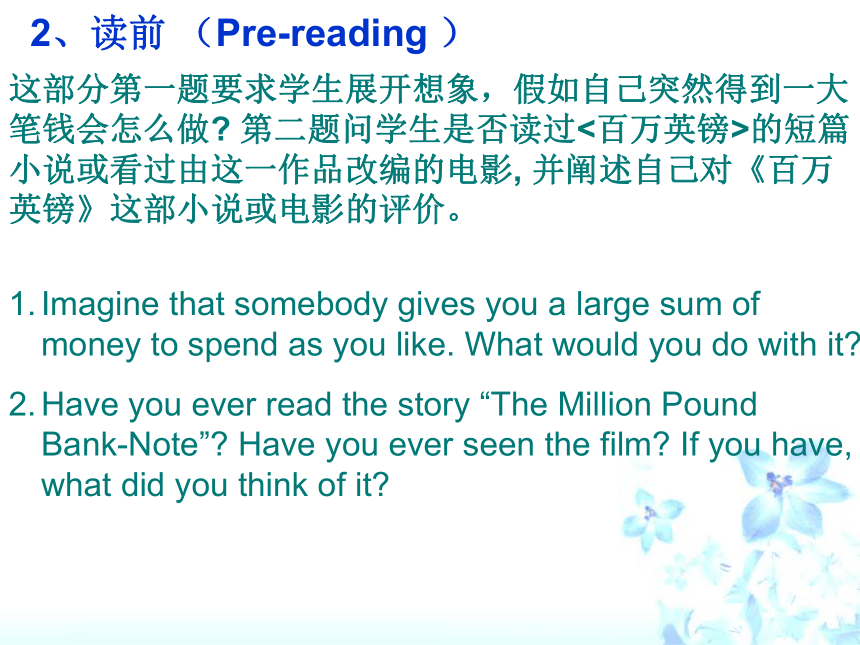
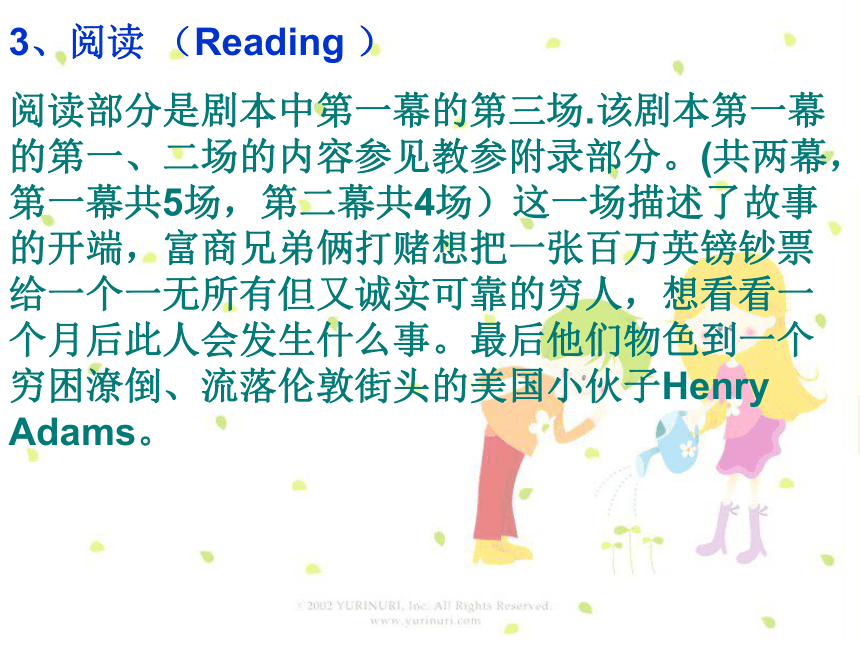
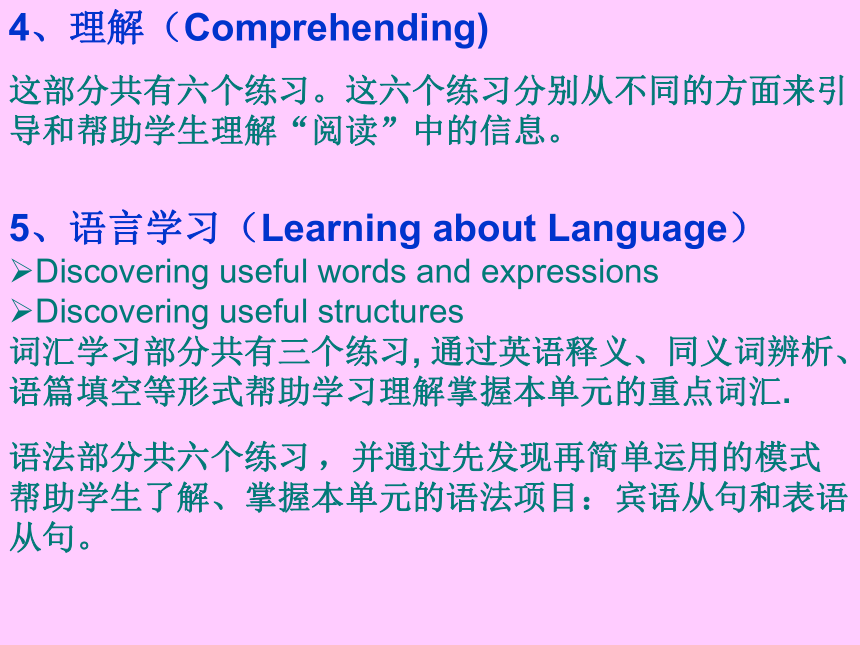
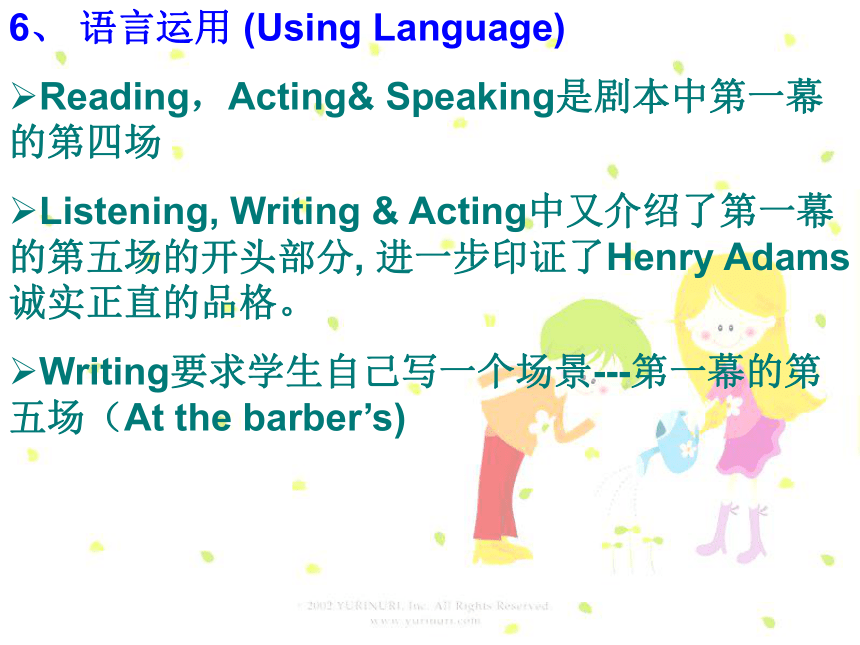
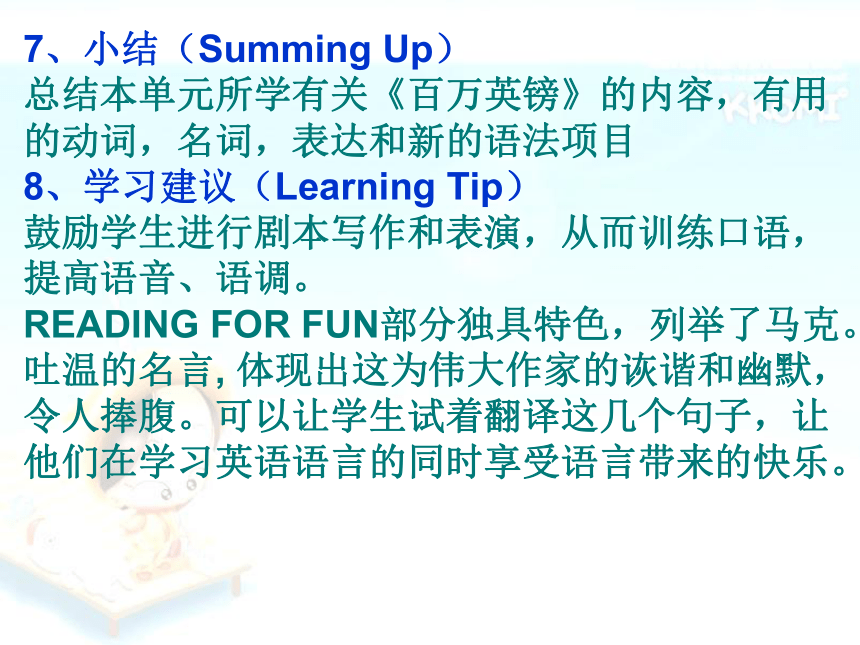
文档简介
课件68张PPT。模块3 Unit 3
The Million Pound Bank-Note一、课程标准内容(Unit 3 The Million Pound Bank-Note )二、教学要求(Unit 3 The Million Pound Bank-Note )语言知识教学目的和要求(Teaching aims and demands)
话题(topics)
Talk about short stories and dramas
Learn how to write a play or drama and act out a play 词汇(useful words and expressions)
1.四会词汇 (35个)
birthplace, novel, adventure, phrase, author, scene, wander, pavement, businessman, permit, ahead, bay, stare, fault, spot, passage, account, embassy, seek, patience, contrary, envelope, unbelievable, steak, pineapple, dessert, amount, rude, manner, scream, genuine, rag, indeed, bow, barber
2. 认读词汇(21个)
Mark Twain, Florida, Hannibal, Missouri, Mississippi, boyhood, Tom Sawyer, Huckleberry Finn, fathom, Samuel Langhorne Clemens, narrator, Roderick, Oliver, bet, penniless, nightfall, unpaid, charity, Horace, issue, fake 3. 固定词组(9个)
bring up, go ahead, by accident, stare at, account for, on the contrary, take a chance, in rags, as for 功能(functional items)
1.Making requests(请求)
Would you please …?
I wonder if you’d mind….
May we ask…?
Could you…?
If you don’t mind, may I …?
Please don’t….
2.Ordering food (点餐)
The waiter or waitress’words:
Can I help you?/ What would you like…?
I’ll take your order in a minute.
Are you ready to order, sir/madam?/ Enjoy your meal!
Here’s your bill./ Here you are.The customer’s words:
I’d like…./ I’d have….
Do you have…?/ What do you suggest?
I’ll have that.
The bill, please./ Can I have the check, please?
语法(grammar)
1.Noun clauses as the object (宾语从句)
Oliver believes that with a million pound bank note a man could survive a month in London.
I wonder, Mr Adams, If you’d mind us asking a few questions.
May we ask what you’re doing in this country and what your plans are?...
2.Noun clauses as the predictive (表语从句)
The fact is that I earned my passage by working as an unpaid hand.
That’s why we’ve given you the letter.
这部分提供了一小段马克.吐温的简介,并要求学生谈谈所知道的他的作品,使学生通过互相交流对马克.吐温及其作品有个初浅的了解.
1.In pairs, discuss what you know about the American writer Mark Twain?
2. Read the short passage, fill in the chart.
3.Do you know any of his novels? Choose one and tell the class about it.
三、教材分析
(一)学生用书(Student’s Book)1、热身(Warming up)2、读前 (Pre-reading )这部分第一题要求学生展开想象,假如自己突然得到一大笔钱会怎么做? 第二题问学生是否读过<百万英镑>的短篇小说或看过由这一作品改编的电影, 并阐述自己对《百万英镑》这部小说或电影的评价。Imagine that somebody gives you a large sum of money to spend as you like. What would you do with it?
Have you ever read the story “The Million Pound Bank-Note”? Have you ever seen the film? If you have, what did you think of it?3、阅读 (Reading )
阅读部分是剧本中第一幕的第三场.该剧本第一幕的第一、二场的内容参见教参附录部分。(共两幕,第一幕共5场,第二幕共4场)这一场描述了故事的开端,富商兄弟俩打赌想把一张百万英镑钞票给一个一无所有但又诚实可靠的穷人,想看看一个月后此人会发生什么事。最后他们物色到一个穷困潦倒、流落伦敦街头的美国小伙子Henry Adams。4、理解(Comprehending)
这部分共有六个练习。这六个练习分别从不同的方面来引导和帮助学生理解“阅读”中的信息。5、语言学习(Learning about Language)
Discovering useful words and expressions
Discovering useful structures
词汇学习部分共有三个练习, 通过英语释义、同义词辨析、语篇填空等形式帮助学习理解掌握本单元的重点词汇.
语法部分共六个练习 ,并通过先发现再简单运用的模式帮助学生了解、掌握本单元的语法项目:宾语从句和表语从句。6、 语言运用 (Using Language)
Reading,Acting& Speaking是剧本中第一幕的第四场
Listening, Writing & Acting中又介绍了第一幕的第五场的开头部分, 进一步印证了Henry Adams 诚实正直的品格。
Writing要求学生自己写一个场景---第一幕的第五场(At the barber’s) 7、小结(Summing Up)
总结本单元所学有关《百万英镑》的内容,有用的动词,名词,表达和新的语法项目
8、学习建议(Learning Tip)
鼓励学生进行剧本写作和表演,从而训练口语,提高语音、语调。
READING FOR FUN部分独具特色,列举了马克。吐温的名言, 体现出这为伟大作家的诙谐和幽默,令人捧腹。可以让学生试着翻译这几个句子,让他们在学习英语语言的同时享受语言带来的快乐。 (二) 练习册(Workbook)
1. TALKING 就第二幕的第一场(At the Tailor’s的开头部分)编一段对话。
2. LISTENING 听力内容为第二幕的第二场(At theTailor’s)。
3 & 4 USING WORDS AND EXPRESSIONS
USING STRUCTURES
分别是就本单元的重点单词、词组及语法的一些巩固性练习。
5. LISTENING TASK
包括听第二幕的第三场,讨论并写下听力部分的续文。
6. READING AND SPEAKING TASK 阅读并表演剧本的第二幕的第四场。
7. WRITING TASK
*8. PROJECT
9. CHECKING YOURSELF(三)剧本的整体安排:
Act One
Scene 1&2 教师教学用书的附录部分
Scene 3 学生用书的“Reading”部分
Scene 4 学生用书“语言运用”的“Reading, acting and speaking”部分
Scene 5 学生用书“语言运用”的“Listening, writing and acting”部分
Act Two
Scene 1 练习册的“Talking”部分
Scene 2 练习册的“Listening”部分
Scene 3 练习册的“Listening task”部分
Scene 4 练习册的“Reading and speaking”部分 四、教学建议---课时安排四、教学建议---分课时教案 The First Period
Warming up, Pre-reading, Extensive reading (Act I Scene One & Two)课时任务
了解美国作家马克吐温生平及其有关作品
初步了解《百万英镑》的故事背景及简介
树立学生正确的金钱观Step One 交流讨论作者生平及其作品
How much do you know abut the American writer Mark Twain and his works?
1.在小组内交流、分享课前收集的有关马克吐温的信息,每个小组派一名reporter进行汇报。
2.把学生收集的零散的信息整理归类,填入下表。有关未知信息引导学生去Warming up部分的一小段简介中共同合作去查寻。
3.让学生介绍他们熟悉的马克.吐温的相关作品. “The Adventures of Tom Sawyer”, “The Adventures of Huckleberry Finn”, “Life on the Mississippi”
4. 适当介绍《百万英镑》这篇小说.Mark TwainHow much do you know about him? Mark Twain
(1835—1910)The greatest humorist of the 19th century
in American literature. Also one of the greatest
writers in the world.NOTEShis masterpieces1876The Adventures of Tom Sawyerhis masterpieces1881The Adventures of Huckleberry Finnhis short storiesThe £ 1,000,000 Bank-NoteGregory PeckStep Two 初步预测故事内容并讨论对金钱的态度。
What do you think may the story be about from the title?
If you’ve got a large sum of money, what will you do with it?
Do you think money is everything?
Do you agree that only money can bring people happiness?
Step Three 介绍故事写作背景,继续预测故事内容并讨论日常生活的打赌经历和对用打赌解决事情这一方法的看法。
So how does the million pound bank note come?
What will the rich brothers in the story do with the million pound bank note?
What is a bet? When do people make a bet?
What will the brothers bet on?
Have you ever made a bet with your friend?
What did you bet on? Did you win or lose?
What do you think of such a way to solve problems?About the £1, 000,000 Bank-note
The Bank of England once issued two notes of a million pounds each, to be used for a special purpose connected with some public transaction with a foreign country. For some reason or other only one of these had been used and canceled; the other still lay in the bank.
The brothers, chatting along, happened to get to wondering what might be the fate of a perfectly honest and intelligent stranger who should be turned adrift in London without a friend and with no money but a million-pound bank-note, and no way to account for his being in possession of it? Would he starve to death or not? Would he get arrested if he tried to change it? Could he live for a month without being sent to jail?
The brothers could not agree on the fate of the young man, so they made a bet, which was a quite
common way to settle a problem at that time in Britain. Step Four 猜测故事情节发展,激发学生对本剧本的兴趣。
Could the brothers find such a person to test the bet?
If so, what will the man’s fate be like?Step Five
快速阅读Act I Scene One and Scene Two, 了解故事发生背景,并回答下列问题。
Where does this bank note come from?
What will the owners do with it?
Who is Henry Adams?
How does he feel at that moment?
Where does he go?
Does he get any help there?Step Six Homework
Learn more about Mark Twain and his works over the internet
Learn about the story—the million pound bank note
http://atheisme.free.fr/Biographies/Twain_e.htm
http://www.online-literature.com/twain/The Second Period
Reading and Comprehending
课时任务:
阅读理解剧本第一幕第三场,学习戏剧的语言,了解作品写作风格,分析人物性格。
学习交际中委婉请求的表达法。
教学方法:
运用图式理论,采取“自上而下”的方式,将篇章作为整体来处理。
设计5个任务(自上而下): prediction, skimming, scanning, discussion, conclusion Step One:复习上一课时有关《百万英镑》故事的背景 ,预测下文故事发展。
What can we learn from the first and second scene?
So predict what will happen to Henry after he leaves the embassy?The Bank of England
bankerAct One Scene OneEmbassy of the USAAct One Scene TwoStep Two: Scanning
Scan the passage and find the answers to the questions:
1. How many characters are there in this scene? Who are they?
2. When and where does the story take place?
3. What do the two old men give Henry?Step Three: Skimming四个任务
1. Do Exercise 1 in Comprehending on Page 19, decide whether the statement is a fact or an opinion.
2. Questions based on the surface understanding of the whole scene:
1) What happens one day when Henry was walking down the street?
2) Where does Henry come from?
3) Why does he come to London and how?
4) Why does he stare at the food on the table when he is talking with the men?
5) What did Henry do before coming to London?
6) How much money does he own?
7) When can Henry open the letter the men give him?
8) What’s inside the letter?
9) Does Henry accept the letter?3. Questions based on the further understanding of the whole scene:
1) Why do the brothers smile at each other on hearing Henry’s unlucky experience?
2) Henry doesn’t quite follow the brothers when Roderick says “It’s an advantage.” Do you know what he means by saying so?
3)Finish Exercise 3 on Page 19 by working in pairs, compare the different feelings Henry has on different occasions.
4 Analyze the stage directions in this scene, the words are used either to show the speaker’s tone of voice or his behavior.
(One of the basic features in the structure of plays is the stage directions, which appear in italics, using the present tense. They provide the director and actors with guidance about how words should be said--tone of voice, or what action actors should take as they say the words--behavior.)
Step Four: Discussion
Questions for discussion: (Exercise 4)
1) What do you think of the brothers and Henry? Find some reasons to support your ideas.
2) What will Henry do with the letter? What will happen to him during the next few hours?
3) What does the writer--Mark Twain try to tell us through such a story?Step Five: Listen to the tape
Find all the examples of polite requests, then rewrite them in informal language.
Would you step inside a moment, please?
Would you please come in?
--I wonder, Mr. Adams, if you’d mind us asking a few questions.
May we ask what you’re doing in this country and what your plans are?
Could you offer me some kind of work here?
If you don’t mind, may I ask you how much money you have?2)Compare Henry’s language with the two brothers’ language, notice the differences. Step Six: Homework
1) Act out this scene in groups of five( a narrator, the servant, the brothers and Henry).
2) Prepare the exercises in Learning about language on Page 20, 21 (SB) and exercises in the Workbook on Page 56, 57.The Third Period
Learning about Language & Using Words and Expressions, Using Structures (WB)
课时任务
学习理解掌握本单元的重点词汇
掌握本单元的语法项目:宾语从句和表语从句Step One
Discovering useful words and expressions
Find the correct word for each of the following meanings.
The same word has several different meanings, explain the usage and meaning of each word in the following 5 groups of sentences.
3. Fill in the blanks with the phrases in the box.
4. Finish the exercises in the Workbook on Page 56 by Using Words and Expressions.
*5. Make up a story with new words and phrases from this unit.Step Two
Discovering useful structures—noun clauses as object
1. 采用间接引语来转述剧中主人公的话,达到复习巩固宾语从句的目的。
1) What does Henry say about his plans in London?
2) What do the brothers ask about Henry’s job?
3) What does Henry say about his accident at sea?
4) What does he say about his passage on the ship?
……
2. Look at the reading passage, find sentences that use a noun clauses as the object.
Well, why don’t you explain what this is all about.
May we ask what you are doing in this country?
……
让学生分析宾语从句,总结语法规则。
3. Do Exercise 2 on Page 21 and Exercise 3 on Page 57 (WB). Rewrite the sentences, using noun clauses as the object.Discovering useful structures—noun clauses as predicative
1. Look at the reading passage; find sentences that use noun clauses as the predicative.
2. Do Exercise 4, 5 on Page 21, make sentences with noun clauses as the predicative.
3. Finish Exercise 1,2 on Page 57 (WB).
用作表语的从句叫做表语从句。
1) 连接词
a. 从属连词一般有that, whether, 如:
Our trouble is that we have little money.
The mother’s question was whether the daughter had finished her homework.
b. 连接代词一般有who, what, 如:
The problem is who we can get to work out this question.
That is what he wants us to do.c. 连接副词一般有when, where, why, how, 如:
That was when I really understand how much my parents loved me.
That’s where she got her first master’s degree.
The question is how the thief got into the house.
2) 位置:一般放在连系动词之后。
3)注意:表语从句中的从属连词that不可省略;从属连词if一般不用来引导表语从句。
*4. Make up a dialogue: Suppose you are looking for a job, make an interview with your partner, an interviewer. Brainstorm some questions and then answer them with noun clauses.
The Fourth Period
Using Language--Reading and acting
课时任务:
阅读理解剧本第一幕第四场,分析人物性格,体会写作风格。
学习交际中点餐的表达法。
学习英语短剧表演,练习表示委婉请求、请求允许和点餐的表达法, 提高口语水平。Step One Pre-reading
Henry gets a letter with money in from the brothers. What will he most probably do with it after he leaves the brothers’ house? Why?Step Two Reading
1. Scanning
Answer the questions by looking at the picture and glancing at the beginning and ending of the text.
1) What does he really do after he leaves the brothers?
2) What food does he order?
3) Does he get into any trouble with the note after the meal?2. Skimming(两个任务)
Read the scene carefully, get the detailed information and find the answers to the questions.
1) Why does Henry ask the waiter to wait for just a few minutes?
2) Why does the owner ask the waiter to go away and take care of the matter himself?
3) Who is Mr. Clemens in the play?
4) Can the note be fake? Why or why not?
5) What do they think of Henry who is in rags after seeing the note?
6) Where is Henry’s seat in the restaurant? Why do they ask him to sit there?
7) How much does Henry pay for the meal?Compare the attitudes of the owner and hostess before and after Henry shows the bank note.Step Three Post-reading
1) Analyze the stage directions, what is the usage of them, to show the speaker’s tone of voice or the behavior?
2) What does the owner mean by saying “We’ll see if he’s clever as a wolf?” and “We will have to take a chance?
3) Find some examples that show the famous writing style of Mark Twain’s--humor and satire.
4) Suppose you were in Henry’s situation, what would you continue to do?Some examples that show the famous writing style of Mark Twain’s--humor and satire.
First, the change in attitude of the owner, the hostess and the waiter when Henry produces a large bank-note they cannot change. So in fact Henry does get a free meal with the note (because they trust him to pay when he can get change) although the restaurant owner would have denied trusting him to pay his meal without it.
(Second, the introduction of Mr. Clemens into the story is also humorous to those people who know that Mark Twain, the writer and Sam Clemens are one and the same. He is there as an authority on whether the bank-note is real or not and also as an observer within his own story.) Step Four
Listen to the tape, pay attention to the expressions used in a restaurant and those used to order food.
That one’s reserved.
Take this gentleman’s order.
I’d like some ham and eggs and a nice big steak.
I’ll have a nice tall glass of beer.
All right. That’s two orders of ham and egg…Step Five Acting
1)学生组成六人小组,分角色表演,注意文中的舞台说明,尽可能接近剧中人物的真实语言。
2)选派若干名学生评委,给表演小组打分。 The Fifth Period
Using language--Listening and writing & Talking, listening (WB) & Learning tips
课时任务
听第一幕第五场的部分内容和第二幕第二场
学习购物的英语交际用语
学写剧本Step One Pre-listening
1. Ask questions about the last scene. Discuss in groups.
How does Henry feel after he leaves the restaurant?
What do you think he will probably do after the experience in the restaurant?
2. Read the questions in the book on Page 23. Get some information from the questions. 1) Why does Henry worry after he leaves the restaurant?
2) Why can’t he see the two brothers again?
3) What do the two brothers ask him to do? He feels worried after he leaves the restaurant.
He goes back to the two brothers’ house.
The two brothers are not at home then and they ask him to do something.Step Two Listening
1. Answer the questions after the first listening:
Why does Henry worry after he leaves the restaurant?
Who opens the door for him?
Where have the brothers gone and when will they be back?
Does the servant help him?
2. Play the tape again, get more information from the text.
What do the brothers think of Henry according to the letter?
Why do they loan him a sum of money?
What will be the result if one of them wins the bet?Step Three Post-listening
Discuss:
1) Why does Henry go back to the two brothers’ house?
2) What might he do with the bank note after he reads the letter? Make a list of things he will do in the next month.
3) What might happen to Henry in the next month as he tries to use the bank-note? Would he get arrested if he tried to change it? Could he live for a month without being sent to prison?Step Four
可能的情景有:
1. He might use it to buy a house and have to leave the bank-not with the house sellers so they will be sure he can pay them.
2. He might take the bank-note to the bank and put it into a bank account. Then he can use smaller amounts of money for his daily needs.
3. He might use the note to buy a business so that he can earn enough money for his daily needs. If he works hard, by the time the brothers return he will be rich enough to pay his debts.4. He might use the bank-note to buy some clothes so that he can look for a job and be able to support himself in London.
5. He might first of all use the note to have a haircut so that he will have a good appearance and that will help him to find a job in London to support himself.
对于后两种情景,教师可以着重加以引导,因为这两种情景就是原剧本的第一幕第五场(后半部分)和第二幕第一场的内容,也是课本的Writing部分和练习册的talking和listening的内容, 因此,这部分的根据情景编对话既是练习册听力的pre-listening, 也为学生学写剧本作好了口头准备。Step Five (Workbook) Listening--Act Two Scene 2
1. 可根据学生所编的在商场购物的对话展开。
In pairs, discuss what you think will happen in the tailor’s shop after Henry shows the clerk and the owner the bank-note.
Will the owner think it’s not a real one or will he think that Henry has stolen it?
2. Now listen to Act Two, Scene 2 of the play on the tape to see what really happened. Then answer the questions on Page 55, 56 in the Workbook.Step Six Writing
学生学会了编剧本内容,现在就是如何把所说的写下来,剧本的写作要求在课本23, 24页的Writing和Learning tip里有具体说明。
Step Seven Homework
Write a scene at the barber’s with a partner, using some stage directions.The Sixth Period
Listening speaking and writing task (WB) & Reading and speaking task (WB) &
Summing up/ check yourself
课时任务
听第二幕第三场,预测故事结局。
阅读第二幕第四场,了解整个剧情。
学会自我评估Step One Listening
Pre-listening
1. Henry does a lot of things in the next month and does not get into trouble at all. But now he does have trouble with one thing, which happens unexpectedly. Guess what it is.
--He falls in love with a woman of his dreams and do not know what he should tell her about himself.
2. What will Henry tell the woman about himself? Will he tell her the truth?3. In pairs, discuss each of the following things:
which things Henry might tell Portia about himself;
which things he might keep a secret about himself;
which things Portia might tell Henry about herself;
which things she might keep a secret about herself;
what they might say about each other.
Listening
Listen to the tape and answer the questions:
How does such a lucky thing come about?
Where does Henry meet the woman of his dreams?
Step Two Reading
1. Predict (post-listening)
What will actually happen between Henry and Portia? Will both of them tell each other their secrets and will they get married?
What will the ending of the story be like?
2. Read the passage, enjoy the ending of the story.
3. Tell the ending of the story in your own words.Step Three Summing up and Check yourself
学生自我检查,自我反思,提高自主学习能力。
Step Four Homework
Watch the film “The Million Pound Bank-Note”, enjoy the typical spoken English.
The Million Pound Bank-Note一、课程标准内容(Unit 3 The Million Pound Bank-Note )二、教学要求(Unit 3 The Million Pound Bank-Note )语言知识教学目的和要求(Teaching aims and demands)
话题(topics)
Talk about short stories and dramas
Learn how to write a play or drama and act out a play 词汇(useful words and expressions)
1.四会词汇 (35个)
birthplace, novel, adventure, phrase, author, scene, wander, pavement, businessman, permit, ahead, bay, stare, fault, spot, passage, account, embassy, seek, patience, contrary, envelope, unbelievable, steak, pineapple, dessert, amount, rude, manner, scream, genuine, rag, indeed, bow, barber
2. 认读词汇(21个)
Mark Twain, Florida, Hannibal, Missouri, Mississippi, boyhood, Tom Sawyer, Huckleberry Finn, fathom, Samuel Langhorne Clemens, narrator, Roderick, Oliver, bet, penniless, nightfall, unpaid, charity, Horace, issue, fake 3. 固定词组(9个)
bring up, go ahead, by accident, stare at, account for, on the contrary, take a chance, in rags, as for 功能(functional items)
1.Making requests(请求)
Would you please …?
I wonder if you’d mind….
May we ask…?
Could you…?
If you don’t mind, may I …?
Please don’t….
2.Ordering food (点餐)
The waiter or waitress’words:
Can I help you?/ What would you like…?
I’ll take your order in a minute.
Are you ready to order, sir/madam?/ Enjoy your meal!
Here’s your bill./ Here you are.The customer’s words:
I’d like…./ I’d have….
Do you have…?/ What do you suggest?
I’ll have that.
The bill, please./ Can I have the check, please?
语法(grammar)
1.Noun clauses as the object (宾语从句)
Oliver believes that with a million pound bank note a man could survive a month in London.
I wonder, Mr Adams, If you’d mind us asking a few questions.
May we ask what you’re doing in this country and what your plans are?...
2.Noun clauses as the predictive (表语从句)
The fact is that I earned my passage by working as an unpaid hand.
That’s why we’ve given you the letter.
这部分提供了一小段马克.吐温的简介,并要求学生谈谈所知道的他的作品,使学生通过互相交流对马克.吐温及其作品有个初浅的了解.
1.In pairs, discuss what you know about the American writer Mark Twain?
2. Read the short passage, fill in the chart.
3.Do you know any of his novels? Choose one and tell the class about it.
三、教材分析
(一)学生用书(Student’s Book)1、热身(Warming up)2、读前 (Pre-reading )这部分第一题要求学生展开想象,假如自己突然得到一大笔钱会怎么做? 第二题问学生是否读过<百万英镑>的短篇小说或看过由这一作品改编的电影, 并阐述自己对《百万英镑》这部小说或电影的评价。Imagine that somebody gives you a large sum of money to spend as you like. What would you do with it?
Have you ever read the story “The Million Pound Bank-Note”? Have you ever seen the film? If you have, what did you think of it?3、阅读 (Reading )
阅读部分是剧本中第一幕的第三场.该剧本第一幕的第一、二场的内容参见教参附录部分。(共两幕,第一幕共5场,第二幕共4场)这一场描述了故事的开端,富商兄弟俩打赌想把一张百万英镑钞票给一个一无所有但又诚实可靠的穷人,想看看一个月后此人会发生什么事。最后他们物色到一个穷困潦倒、流落伦敦街头的美国小伙子Henry Adams。4、理解(Comprehending)
这部分共有六个练习。这六个练习分别从不同的方面来引导和帮助学生理解“阅读”中的信息。5、语言学习(Learning about Language)
Discovering useful words and expressions
Discovering useful structures
词汇学习部分共有三个练习, 通过英语释义、同义词辨析、语篇填空等形式帮助学习理解掌握本单元的重点词汇.
语法部分共六个练习 ,并通过先发现再简单运用的模式帮助学生了解、掌握本单元的语法项目:宾语从句和表语从句。6、 语言运用 (Using Language)
Reading,Acting& Speaking是剧本中第一幕的第四场
Listening, Writing & Acting中又介绍了第一幕的第五场的开头部分, 进一步印证了Henry Adams 诚实正直的品格。
Writing要求学生自己写一个场景---第一幕的第五场(At the barber’s) 7、小结(Summing Up)
总结本单元所学有关《百万英镑》的内容,有用的动词,名词,表达和新的语法项目
8、学习建议(Learning Tip)
鼓励学生进行剧本写作和表演,从而训练口语,提高语音、语调。
READING FOR FUN部分独具特色,列举了马克。吐温的名言, 体现出这为伟大作家的诙谐和幽默,令人捧腹。可以让学生试着翻译这几个句子,让他们在学习英语语言的同时享受语言带来的快乐。 (二) 练习册(Workbook)
1. TALKING 就第二幕的第一场(At the Tailor’s的开头部分)编一段对话。
2. LISTENING 听力内容为第二幕的第二场(At theTailor’s)。
3 & 4 USING WORDS AND EXPRESSIONS
USING STRUCTURES
分别是就本单元的重点单词、词组及语法的一些巩固性练习。
5. LISTENING TASK
包括听第二幕的第三场,讨论并写下听力部分的续文。
6. READING AND SPEAKING TASK 阅读并表演剧本的第二幕的第四场。
7. WRITING TASK
*8. PROJECT
9. CHECKING YOURSELF(三)剧本的整体安排:
Act One
Scene 1&2 教师教学用书的附录部分
Scene 3 学生用书的“Reading”部分
Scene 4 学生用书“语言运用”的“Reading, acting and speaking”部分
Scene 5 学生用书“语言运用”的“Listening, writing and acting”部分
Act Two
Scene 1 练习册的“Talking”部分
Scene 2 练习册的“Listening”部分
Scene 3 练习册的“Listening task”部分
Scene 4 练习册的“Reading and speaking”部分 四、教学建议---课时安排四、教学建议---分课时教案 The First Period
Warming up, Pre-reading, Extensive reading (Act I Scene One & Two)课时任务
了解美国作家马克吐温生平及其有关作品
初步了解《百万英镑》的故事背景及简介
树立学生正确的金钱观Step One 交流讨论作者生平及其作品
How much do you know abut the American writer Mark Twain and his works?
1.在小组内交流、分享课前收集的有关马克吐温的信息,每个小组派一名reporter进行汇报。
2.把学生收集的零散的信息整理归类,填入下表。有关未知信息引导学生去Warming up部分的一小段简介中共同合作去查寻。
3.让学生介绍他们熟悉的马克.吐温的相关作品. “The Adventures of Tom Sawyer”, “The Adventures of Huckleberry Finn”, “Life on the Mississippi”
4. 适当介绍《百万英镑》这篇小说.Mark TwainHow much do you know about him? Mark Twain
(1835—1910)The greatest humorist of the 19th century
in American literature. Also one of the greatest
writers in the world.NOTEShis masterpieces1876The Adventures of Tom Sawyerhis masterpieces1881The Adventures of Huckleberry Finnhis short storiesThe £ 1,000,000 Bank-NoteGregory PeckStep Two 初步预测故事内容并讨论对金钱的态度。
What do you think may the story be about from the title?
If you’ve got a large sum of money, what will you do with it?
Do you think money is everything?
Do you agree that only money can bring people happiness?
Step Three 介绍故事写作背景,继续预测故事内容并讨论日常生活的打赌经历和对用打赌解决事情这一方法的看法。
So how does the million pound bank note come?
What will the rich brothers in the story do with the million pound bank note?
What is a bet? When do people make a bet?
What will the brothers bet on?
Have you ever made a bet with your friend?
What did you bet on? Did you win or lose?
What do you think of such a way to solve problems?About the £1, 000,000 Bank-note
The Bank of England once issued two notes of a million pounds each, to be used for a special purpose connected with some public transaction with a foreign country. For some reason or other only one of these had been used and canceled; the other still lay in the bank.
The brothers, chatting along, happened to get to wondering what might be the fate of a perfectly honest and intelligent stranger who should be turned adrift in London without a friend and with no money but a million-pound bank-note, and no way to account for his being in possession of it? Would he starve to death or not? Would he get arrested if he tried to change it? Could he live for a month without being sent to jail?
The brothers could not agree on the fate of the young man, so they made a bet, which was a quite
common way to settle a problem at that time in Britain. Step Four 猜测故事情节发展,激发学生对本剧本的兴趣。
Could the brothers find such a person to test the bet?
If so, what will the man’s fate be like?Step Five
快速阅读Act I Scene One and Scene Two, 了解故事发生背景,并回答下列问题。
Where does this bank note come from?
What will the owners do with it?
Who is Henry Adams?
How does he feel at that moment?
Where does he go?
Does he get any help there?Step Six Homework
Learn more about Mark Twain and his works over the internet
Learn about the story—the million pound bank note
http://atheisme.free.fr/Biographies/Twain_e.htm
http://www.online-literature.com/twain/The Second Period
Reading and Comprehending
课时任务:
阅读理解剧本第一幕第三场,学习戏剧的语言,了解作品写作风格,分析人物性格。
学习交际中委婉请求的表达法。
教学方法:
运用图式理论,采取“自上而下”的方式,将篇章作为整体来处理。
设计5个任务(自上而下): prediction, skimming, scanning, discussion, conclusion Step One:复习上一课时有关《百万英镑》故事的背景 ,预测下文故事发展。
What can we learn from the first and second scene?
So predict what will happen to Henry after he leaves the embassy?The Bank of England
bankerAct One Scene OneEmbassy of the USAAct One Scene TwoStep Two: Scanning
Scan the passage and find the answers to the questions:
1. How many characters are there in this scene? Who are they?
2. When and where does the story take place?
3. What do the two old men give Henry?Step Three: Skimming四个任务
1. Do Exercise 1 in Comprehending on Page 19, decide whether the statement is a fact or an opinion.
2. Questions based on the surface understanding of the whole scene:
1) What happens one day when Henry was walking down the street?
2) Where does Henry come from?
3) Why does he come to London and how?
4) Why does he stare at the food on the table when he is talking with the men?
5) What did Henry do before coming to London?
6) How much money does he own?
7) When can Henry open the letter the men give him?
8) What’s inside the letter?
9) Does Henry accept the letter?3. Questions based on the further understanding of the whole scene:
1) Why do the brothers smile at each other on hearing Henry’s unlucky experience?
2) Henry doesn’t quite follow the brothers when Roderick says “It’s an advantage.” Do you know what he means by saying so?
3)Finish Exercise 3 on Page 19 by working in pairs, compare the different feelings Henry has on different occasions.
4 Analyze the stage directions in this scene, the words are used either to show the speaker’s tone of voice or his behavior.
(One of the basic features in the structure of plays is the stage directions, which appear in italics, using the present tense. They provide the director and actors with guidance about how words should be said--tone of voice, or what action actors should take as they say the words--behavior.)
Step Four: Discussion
Questions for discussion: (Exercise 4)
1) What do you think of the brothers and Henry? Find some reasons to support your ideas.
2) What will Henry do with the letter? What will happen to him during the next few hours?
3) What does the writer--Mark Twain try to tell us through such a story?Step Five: Listen to the tape
Find all the examples of polite requests, then rewrite them in informal language.
Would you step inside a moment, please?
Would you please come in?
--I wonder, Mr. Adams, if you’d mind us asking a few questions.
May we ask what you’re doing in this country and what your plans are?
Could you offer me some kind of work here?
If you don’t mind, may I ask you how much money you have?2)Compare Henry’s language with the two brothers’ language, notice the differences. Step Six: Homework
1) Act out this scene in groups of five( a narrator, the servant, the brothers and Henry).
2) Prepare the exercises in Learning about language on Page 20, 21 (SB) and exercises in the Workbook on Page 56, 57.The Third Period
Learning about Language & Using Words and Expressions, Using Structures (WB)
课时任务
学习理解掌握本单元的重点词汇
掌握本单元的语法项目:宾语从句和表语从句Step One
Discovering useful words and expressions
Find the correct word for each of the following meanings.
The same word has several different meanings, explain the usage and meaning of each word in the following 5 groups of sentences.
3. Fill in the blanks with the phrases in the box.
4. Finish the exercises in the Workbook on Page 56 by Using Words and Expressions.
*5. Make up a story with new words and phrases from this unit.Step Two
Discovering useful structures—noun clauses as object
1. 采用间接引语来转述剧中主人公的话,达到复习巩固宾语从句的目的。
1) What does Henry say about his plans in London?
2) What do the brothers ask about Henry’s job?
3) What does Henry say about his accident at sea?
4) What does he say about his passage on the ship?
……
2. Look at the reading passage, find sentences that use a noun clauses as the object.
Well, why don’t you explain what this is all about.
May we ask what you are doing in this country?
……
让学生分析宾语从句,总结语法规则。
3. Do Exercise 2 on Page 21 and Exercise 3 on Page 57 (WB). Rewrite the sentences, using noun clauses as the object.Discovering useful structures—noun clauses as predicative
1. Look at the reading passage; find sentences that use noun clauses as the predicative.
2. Do Exercise 4, 5 on Page 21, make sentences with noun clauses as the predicative.
3. Finish Exercise 1,2 on Page 57 (WB).
用作表语的从句叫做表语从句。
1) 连接词
a. 从属连词一般有that, whether, 如:
Our trouble is that we have little money.
The mother’s question was whether the daughter had finished her homework.
b. 连接代词一般有who, what, 如:
The problem is who we can get to work out this question.
That is what he wants us to do.c. 连接副词一般有when, where, why, how, 如:
That was when I really understand how much my parents loved me.
That’s where she got her first master’s degree.
The question is how the thief got into the house.
2) 位置:一般放在连系动词之后。
3)注意:表语从句中的从属连词that不可省略;从属连词if一般不用来引导表语从句。
*4. Make up a dialogue: Suppose you are looking for a job, make an interview with your partner, an interviewer. Brainstorm some questions and then answer them with noun clauses.
The Fourth Period
Using Language--Reading and acting
课时任务:
阅读理解剧本第一幕第四场,分析人物性格,体会写作风格。
学习交际中点餐的表达法。
学习英语短剧表演,练习表示委婉请求、请求允许和点餐的表达法, 提高口语水平。Step One Pre-reading
Henry gets a letter with money in from the brothers. What will he most probably do with it after he leaves the brothers’ house? Why?Step Two Reading
1. Scanning
Answer the questions by looking at the picture and glancing at the beginning and ending of the text.
1) What does he really do after he leaves the brothers?
2) What food does he order?
3) Does he get into any trouble with the note after the meal?2. Skimming(两个任务)
Read the scene carefully, get the detailed information and find the answers to the questions.
1) Why does Henry ask the waiter to wait for just a few minutes?
2) Why does the owner ask the waiter to go away and take care of the matter himself?
3) Who is Mr. Clemens in the play?
4) Can the note be fake? Why or why not?
5) What do they think of Henry who is in rags after seeing the note?
6) Where is Henry’s seat in the restaurant? Why do they ask him to sit there?
7) How much does Henry pay for the meal?Compare the attitudes of the owner and hostess before and after Henry shows the bank note.Step Three Post-reading
1) Analyze the stage directions, what is the usage of them, to show the speaker’s tone of voice or the behavior?
2) What does the owner mean by saying “We’ll see if he’s clever as a wolf?” and “We will have to take a chance?
3) Find some examples that show the famous writing style of Mark Twain’s--humor and satire.
4) Suppose you were in Henry’s situation, what would you continue to do?Some examples that show the famous writing style of Mark Twain’s--humor and satire.
First, the change in attitude of the owner, the hostess and the waiter when Henry produces a large bank-note they cannot change. So in fact Henry does get a free meal with the note (because they trust him to pay when he can get change) although the restaurant owner would have denied trusting him to pay his meal without it.
(Second, the introduction of Mr. Clemens into the story is also humorous to those people who know that Mark Twain, the writer and Sam Clemens are one and the same. He is there as an authority on whether the bank-note is real or not and also as an observer within his own story.) Step Four
Listen to the tape, pay attention to the expressions used in a restaurant and those used to order food.
That one’s reserved.
Take this gentleman’s order.
I’d like some ham and eggs and a nice big steak.
I’ll have a nice tall glass of beer.
All right. That’s two orders of ham and egg…Step Five Acting
1)学生组成六人小组,分角色表演,注意文中的舞台说明,尽可能接近剧中人物的真实语言。
2)选派若干名学生评委,给表演小组打分。 The Fifth Period
Using language--Listening and writing & Talking, listening (WB) & Learning tips
课时任务
听第一幕第五场的部分内容和第二幕第二场
学习购物的英语交际用语
学写剧本Step One Pre-listening
1. Ask questions about the last scene. Discuss in groups.
How does Henry feel after he leaves the restaurant?
What do you think he will probably do after the experience in the restaurant?
2. Read the questions in the book on Page 23. Get some information from the questions. 1) Why does Henry worry after he leaves the restaurant?
2) Why can’t he see the two brothers again?
3) What do the two brothers ask him to do? He feels worried after he leaves the restaurant.
He goes back to the two brothers’ house.
The two brothers are not at home then and they ask him to do something.Step Two Listening
1. Answer the questions after the first listening:
Why does Henry worry after he leaves the restaurant?
Who opens the door for him?
Where have the brothers gone and when will they be back?
Does the servant help him?
2. Play the tape again, get more information from the text.
What do the brothers think of Henry according to the letter?
Why do they loan him a sum of money?
What will be the result if one of them wins the bet?Step Three Post-listening
Discuss:
1) Why does Henry go back to the two brothers’ house?
2) What might he do with the bank note after he reads the letter? Make a list of things he will do in the next month.
3) What might happen to Henry in the next month as he tries to use the bank-note? Would he get arrested if he tried to change it? Could he live for a month without being sent to prison?Step Four
可能的情景有:
1. He might use it to buy a house and have to leave the bank-not with the house sellers so they will be sure he can pay them.
2. He might take the bank-note to the bank and put it into a bank account. Then he can use smaller amounts of money for his daily needs.
3. He might use the note to buy a business so that he can earn enough money for his daily needs. If he works hard, by the time the brothers return he will be rich enough to pay his debts.4. He might use the bank-note to buy some clothes so that he can look for a job and be able to support himself in London.
5. He might first of all use the note to have a haircut so that he will have a good appearance and that will help him to find a job in London to support himself.
对于后两种情景,教师可以着重加以引导,因为这两种情景就是原剧本的第一幕第五场(后半部分)和第二幕第一场的内容,也是课本的Writing部分和练习册的talking和listening的内容, 因此,这部分的根据情景编对话既是练习册听力的pre-listening, 也为学生学写剧本作好了口头准备。Step Five (Workbook) Listening--Act Two Scene 2
1. 可根据学生所编的在商场购物的对话展开。
In pairs, discuss what you think will happen in the tailor’s shop after Henry shows the clerk and the owner the bank-note.
Will the owner think it’s not a real one or will he think that Henry has stolen it?
2. Now listen to Act Two, Scene 2 of the play on the tape to see what really happened. Then answer the questions on Page 55, 56 in the Workbook.Step Six Writing
学生学会了编剧本内容,现在就是如何把所说的写下来,剧本的写作要求在课本23, 24页的Writing和Learning tip里有具体说明。
Step Seven Homework
Write a scene at the barber’s with a partner, using some stage directions.The Sixth Period
Listening speaking and writing task (WB) & Reading and speaking task (WB) &
Summing up/ check yourself
课时任务
听第二幕第三场,预测故事结局。
阅读第二幕第四场,了解整个剧情。
学会自我评估Step One Listening
Pre-listening
1. Henry does a lot of things in the next month and does not get into trouble at all. But now he does have trouble with one thing, which happens unexpectedly. Guess what it is.
--He falls in love with a woman of his dreams and do not know what he should tell her about himself.
2. What will Henry tell the woman about himself? Will he tell her the truth?3. In pairs, discuss each of the following things:
which things Henry might tell Portia about himself;
which things he might keep a secret about himself;
which things Portia might tell Henry about herself;
which things she might keep a secret about herself;
what they might say about each other.
Listening
Listen to the tape and answer the questions:
How does such a lucky thing come about?
Where does Henry meet the woman of his dreams?
Step Two Reading
1. Predict (post-listening)
What will actually happen between Henry and Portia? Will both of them tell each other their secrets and will they get married?
What will the ending of the story be like?
2. Read the passage, enjoy the ending of the story.
3. Tell the ending of the story in your own words.Step Three Summing up and Check yourself
学生自我检查,自我反思,提高自主学习能力。
Step Four Homework
Watch the film “The Million Pound Bank-Note”, enjoy the typical spoken English.
同课章节目录
